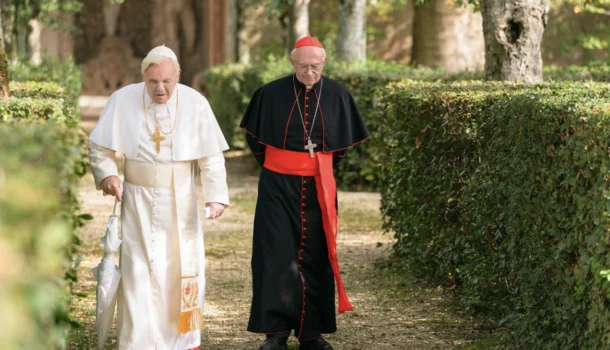Not every conversation cloaked in solemnity deserves the rigidity of pulpits or the polish of reverence. In “The Two Popes”, Fernando Meirelles dismantles a setting that might lend itself to a theater of infallibility, choosing instead a more disquieting and disarmed construction: a silent clash between two men marked by doubt. What first appears to be an ideological duel between theological rigor and pastoral empathy soon reveals another layer — more ambiguous, more human — in which internal tensions speak louder than any creed. These are not antagonists on opposite sides of reform, but men who each carry, in their own way, the burden of not knowing what to do with their faith.
Anthony McCarten, well-versed in navigating the unstable ground of storied biographies, avoids the trap of easy definitions. His script embraces discomfort: the discomfort of not fitting within dogma, of speaking with hesitation, retreating without shame, stumbling in search of a balance between the divine and the fallible. Benedict 16 and Francis are not symbols in binary opposition, but dissonant mirrors of a shared moral unease. Their dialogue is woven from the fibers of contradiction, and it’s in this back-and-forth that intimacy takes hold. Nothing is resolved through imposition; everything demands to be listened to — even what remains unspoken.
That listening takes shape through the finely calibrated performances of Hopkins and Pryce, where each pause carries more weight than any speech. Hopkins, with his eyes alone, turns silence into a quiet form of penance. Pryce, through his reluctance to speak, rebuilds dignity from discomfort. There’s no theatrical grandstanding here, no bid for transcendent drama; only fatigue, restraint, and humanity suffocated by a liturgy that demands quick answers for lifelong questions. Their interaction resists catharsis — it is noise and echo, tension and release, timed with the rhythm of hesitation.
Meirelles understands that no truth can be grasped beneath the Vatican’s stained glass if the camera’s gaze doesn’t also venture out into the streets. That’s why he juxtaposes the weight of sacred domes with the simplicity of kitchens, plazas, and football stands. This oscillation is not merely aesthetic, but ethical: sanctity is not the altar’s monopoly. By deconstructing liturgical spaces without caricature, the director invites us to observe with detachment but also with a proximity that dismantles aura without eroding respect. The sacred here lies not in the setting, but in the imperfect, courageous attempt at dialogue.
What is ultimately revealed is not a portrait of the Church as an institution, but an exploration of the complexity of inheriting guilt one did not choose. The film isn’t interested in judgment or redemption. It is driven by the notion that not all moral conflicts can be solved through faith — and that listening may, in fact, be the most radical gesture of humility in a world dominated by certainties. By avoiding glorification and demonization, the narrative offers something more challenging: an honest exchange between two worlds that had to learn to tolerate before they could begin to understand.
This tolerance doesn’t emerge as concession, but as the discovery of a shared ground where dissent doesn’t call for erasure but for presence. When the two men sit face to face, what’s at stake isn’t just the future of the Church, but the possibility that empathy might survive doctrine. The viewer, far from being handed answers, is invited to sit with discomfort — the kind that cannot be prayed away, but must be borne under the weight of sustained doubt. A discomfort that doesn’t relent, even in the face of forgiveness.
This film refuses the comfort of easy reconciliation. Its greatest achievement lies in straining the space between institutional imperative and intimate silence, without resorting to a redemption arc. What arises from this friction is a portrait of listening as a political act, doubt as a form of resistance, and coexistence as a difficult choice. “The Two Popes” offers no relief — it offers complexity. And in its refusal of simplification, lies its most unsettling greatness.
Film: The Two Popes
Director: Fernando Meirelles
Year: 2019
Genres: Biography/Drama
Rating: 9/10

